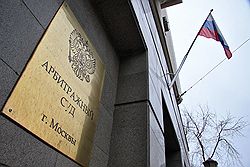B - Arguments for counterfeit goods

The idea of bringing Internet providers to account for placing counterfeit products on their server stumbled over the very first case, considered by the Presidium of the Supreme Arbitration Court (IAC). The courts will now have to figure out who the site belonged to and whether the provider could control its content. Such a conclusion was made by the EAC shortly before the first public discussion of the draft resolution of the plenums of the Supreme Court of the Russian Federation and the EAC, in which it is proposed to recover compensation even from innocent exclusive rights violators.
Yesterday, the Presidium of YOU considered the first case in its practice about the responsibility of the hosting provider for placing counterfeit products on the Internet. The lawsuit was filed against the hosting provider ZAO Masterhost: on its server was the site zaycev.net, known for being able to download songs for free. On the site itself it is said that “all the music on the server is presented solely for familiarization listening,” but there is also a reminder that files in rar or doc formats must be reformatted into mp3 after downloading. The dispute arose due to the fact that the site zaycev.net was placed famous songs to music by Evgeny Krylatov “Winged seesaw” and “Beautiful far”, as well as “Alexander” from the movie “Moscow Doesn't Believe in Tears”, the music for which was written by Sergey Nikitin.
')
In February 2007, a lawsuit was filed by Content and Law LLC, which received exclusive rights to use songs in 2005 under contracts with composers. The plaintiff demanded to recover from the "Masterkhost" 200 thousand rubles. compensation.
The Moscow Arbitration Court on November 8, 2007 rejected the claim. The court came to the conclusion that the owner of the resource zaycev.net is LLC “Metcom”, to which no claims were made. A Masterhost, according to the court, provides its subscribers only technical services for data transmission on the Internet and "does not control the content of information stored, published or distributed by the subscriber using the services provided." But on February 5, the 9th Arbitration Court of Appeal decided to charge 140,000 rubles from Masterhost. compensation. According to the Court of Appeal, the counterfeit materials were located on the Masterhost server, which could also post information on the Internet itself. The ruling says that Masterhost did not prove that “Mark” paid for technical services, but “Mark” itself could not be found. The Court of Cassation, on May 13, upheld the appeal.
Yesterday, the Presidium of the Supreme Arbitration Court referred the case for a new consideration to the Moscow Arbitration Court. In determining the transfer of the case to the presidium, the panel of judges of the Supreme Arbitration Court investigated in detail the technical features of posting information on the Internet. According to the judges of YOU, the courts have not yet determined who actually owns the site zaycev.net.
Andrei Cherkasov, the CEO of Content and Law, says he would not have had any complaints against Masterhost if he had presented documents confirming that the servers had been leased. Partner of the law firm Salans Victor Naumov believes that the question of the provider’s responsibility for the user's actions is one of the main problems of Internet regulation. Recently, the courts offered to recover damages or compensation even from innocent offenders, which the same providers could unwittingly be. This situation appeared in the draft resolution of the plenums of the Supreme Court of the Russian Federation and the Supreme Arbitration Court concerning intellectual property (see Kommersant of November 27). The first public discussion of the document was appointed by the Presidium of the Supreme Arbitration Court on January 15.
Recently, three websites have already received claims from copyright holders whose users post videos: mail.ru, vkontakte.ru and rambler.ru. Mail.ru settled the conflict with the claimant VGTRK (TV channels "Russia", "Culture", "Sport", "Vesti-24"), concluding a settlement agreement (see. "Kommersant" on November 25). According to the document, VGTRK agreed to place the licensed content on the video hosting mail.ru, and the resulting advertising revenue will be shared between the partners. In the case of vkontakte.ru and rambler.ru, the right holders want to conclude similar agreements with them.
But the very first thing that came to the presidium of the Supreme Arbitration Court showed that the practice of bringing providers to justice without taking into account their guilt may not be formed. “The court will have to figure out every time whether the provider had the technical ability to control the content of the materials placed on its server,” concludes Pavel Monakov, deputy general director of Law and Consultations. Vadim Uskov, a lawyer at Uskov and Partners law firm, is sure that sending the case for new consideration avoided creating a dangerous precedent: “This allows us to hope that the idea reflected in the draft resolution of the plenums of the Supreme Court of the Russian Federation and the Supreme Arbitration Court will not be developed.”
The general director of Mediamir (owns smotri.com video hosting), Mikhail Gurevich, says that it’s almost impossible to control the content hosted on the hosting: “To do this, you will have to hire an army of moderators who will check every piece of work”. In addition, says Mr. Gurevich, site moderators are often unable to determine who owns the rights to certain content. And Viktor Naumov said that in developed foreign countries the provider is usually only liable if he was notified of the violation and did not take any action to eliminate it.
Olga b-Pleshanova, Alexander b-Malakhov
original www.kommersant.ru/doc.aspx?DocsID=1098929
Source: https://habr.com/ru/post/47816/
All Articles